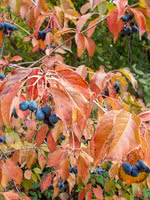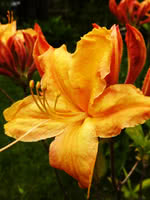Mon-Fri 9am - 5pm Mountain time
Nannyberry vs Golden Lights Rhododendron (Azalea)
Viburnum lentago
Rhododendron x Golden Lights
NOT AVAILABLE THIS SEASON - MIGHT RETURN
NOT AVAILABLE THIS SEASON - MIGHT RETURN
(we don't know if or when this product will be restocked)
Nannyberry is a hardy shrub known for attracting wildlife. Its clusters of white flowers and tasty berries are suitable for bees, birds, and other animals.
Nannyberry is also used in urban yards and landscaping. This shrub makes a beautiful ornamental and is small enough to grow underneath power lines. Its berries can be eaten fresh or used in baking and preserves.
Makes a great hedge or privacy screen in an urban yard. Often has great red fall color to complement its spring flowers.
Golden Lights Rhododendron is an exceptionally cold hardy, deciduous azalea. Part of the Northern Lights Series, this shrub was cultivated specifically to withstand harsh winters, making it ideal for our prairie climate.
In late spring you'll be drawn to its beautiful, golden, sweetly fragrant flowers. Pruning is recommended after the flowers are spent to control the size and shape of this shrub.
Consider Golden Lights Rhododendron when planning your next hedge, or plant it on its own as a striking specimen plant.
Nannyberry Quick Facts
Golden Lights Rhododendron (Azalea) Quick Facts
Toxicity: All parts of a rhododendron bush, including the leaves, stems and blooms, are toxic to cats, dogs, and horses.

